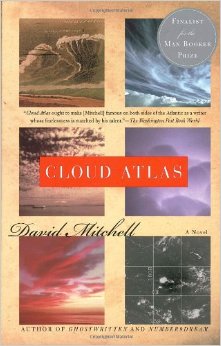Book Review: David Mitchell’s “Cloud Atlas”
by Miles Raymer
After several years of observing the barrage of praise that’s been heaped upon Cloud Atlas by friends and critics, I finally sat down to read it, convinced it couldn’t possibly live up to the hype. One hundred pages in, I’d already dismissed David Mitchell’s well-loved book as nothing more than a garish, sprawling, unfocused coterie of narratives bound together by a few clever but ultimately superficial conceits. I began composing caustic critiques for my own little takedown of yet another overblown, undeserving splash in the ever-fickle and misguided Culture. I even scoffed at first when one of Mitchell’s characters chided me indirectly: “‘Come now, what’s a reviewer?…One who reads quickly, arrogantly, but never wisely…'” (149). Despite my initial, haughty dismissal of this insightful quip, it jogged something loose in my mind, uncovered a new torrent of curiosity driven by a petulant but nevertheless honest desire to “read wisely.” As I pressed on, this impulse––which began as a small whisper of the four most important words in the English language: “I might be wrong”––blossomed into a stentorian declaration of appreciation for this magnificent novel.
Cloud Atlas is not just one of the best books I’ve ever read, but also one of the best I think I’m likely to ever read. It is a rare flower that unfurls with painstaking, meticulous precision, blooms for a full season within a reader’s heart, and then dies slowly, gracefully, shedding its petals into the unknown vicissitudes of past, present, and future time. Mitchell is clearly a writer of the highest order; he commands language in highly specialized and variable ways, and does so without uprooting himself from the human manure that fertilizes all worthwhile and meaningful stories. Mitchell’s most notable achievement here is a seventy-page section written in a singular and thoroughly enchanting dialect, one couched between humanity’s ignorant past and our debatably enlightened future. While this segment is resplendent enough to stand as its own novella, the fact that it’s situated at the delectable core of six interrelated and structurally distinct stories, each of which provides its own charm and philosophical import, renders Cloud Atlas a nuanced and unquestionably dazzling beacon of humanist compassion, understanding, and wisdom.
Most noble is David Mitchell’s problematization of Progress, that wild bitch of an idea that betrays human endeavor with one breath and salvages it from the dessicated shitpile of self-destructive impulse with the next. Discrimination, deceit, brutality, melioration, redemption, virtue––these are all put to work not as abstract caricatures designed to placate and distract, but as complicated and cyclical habits of action that reveal our many shortcomings and precipitate new energies with which we might give birth to better times and beat back our more callow callings for one more day. Mitchell’s simple but enduring message, that we are the sum of our actions, and those actions come from our beliefs about how the world is and how we ultimately want it to be, could not be put to better use. No, we do not, we must not, conceive of progress as that plodding, reliable, inevitable justification for madness that has plagued our past and will with sad certainty undergo even more harmful resurrections in the future. But we can change, we cannot help but change, and some of those changes might be for the better if we dedicate ourselves to fostering whatever grace and quiet virtue we can carve from the collective headstone of our downtrodden but resilient mortal coils.
Cloud Atlas resides in the vaporous spaces between form and chaos where choosing creatures fumble with the illusion of their own uncertainty. It is a staggering and momentous piece of fiction, one that begs a question: can we give credence to our best selves at the blessed and rarefied moments they actually stir within us, or are we forever condemned to look back and chart the tragedy of our unrealized goodness? Can we lift our heads and transcend, even if only for a moment, the tireless trek away from our would-be killers, the overseers of time, entropy and scarcity, long enough to watch the clouds pass overhead? Too often we don’t, but David Mitchell’s words echo across that darkening, ephemeral horizon: We can, we can, we can.
Rating: 10/10
